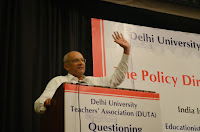Eminent educationists, public intellectuals, representatives of teachers’ and students’ bodies and parliamentarians came together to raise important questions on the unidirectional policy framework in Higher Education, as evidenced by the hurried attempts to implement CBCS, a Common Central Universities Bill and the RUSA.
Instead of providing a more flexible and better learning environment to students, the Semester-based CBCS, wherever implemented, has resulted in academic degradation and stultification of creativity. Its common curriculum undermines real choice and instead, forces standardization. Speakers pointed out that such standardization is inimical to the production of new knowledge as it emphasizes on passive learning and skill-training instead of the critical confidence needed to question orthodoxy.
Speakers included:
Arun Kumar, former JNUTA President; B S Saraswat, IGNOUTA President; Manpreet Kang, IPUTA President; M S Bhatt, JTA, Secretary; Tanika Sarkar, Retd. JNU; Farida Khan, Jamia Millia; Prabhat Patnaik, Retd JNU; Apoorvanand, DU; Ritabrata Banerjee, MP, CPI-M; Arundhati Roy, writer; D P Tripathi, NCP; Kiran Walia, Congress; Rajesh Gogna, Human Rights Defense International; Colin Gonsalves, Human Rights Law Network; Anil Sadgopal, AIFRTE; Prashant, AIDSO; Om Prasad, AISA; Vikram Singh, SFI; Rahila Parveen, AISF; Anshuman, Chhatra JD(U); Baby, DISHA; Nandita Narain, DUTA; Harish Khanna, DUTA and Amar Kanwar, Film-maker.
The convention adopted the following resolution:
Public Statement of Convention
“Questioning Policy Direction in Higher Education”
25 May 2015, India International Centre, New Delhi
The future of higher education in India is linked to the fundamental questions of equity and democracy in our society as well as to our ability, as a sovereign nation, to confront diverse challenges in an era in which knowledge is playing a key and ever more powerful role. The strengthening of the public-funded system in higher education is a precondition to the nation’s ability to combat growing inequality, social prejudice and the continuing exclusion of many sections from public life. While public policy is expected to reflect this concern, the currently proposed changes in the policy framework on higher education contradict it. They seek to divest the State of its responsibility of ensuring greater access, equity and quality in higher education while allowing private and foreign interests to make deeper inroads into the common people’s income and aspirations in this sector.
Through the CBCS (in implementation since 2008), the National Accreditation and Ranking parameters, the financing plan under the Rashtriya Ucchatar Shiksha Abhiyan (RUSA) and the authoritarian Common Central Universities Bill, the public policy framework will cause degradation of teaching-learning in public-funded universities, the transfer of commonly owned resources into private hands, reduced funding of public-funded institutions and undermine democratic decision-making through corporate models of governance and commercialisation of knowledge.
This Convention notes that none of these policy changes are based on rigorous study or assessment of the specific experiences and needs of higher education in India. Instead, they are derived from models in North America and Europe without debate as to their applicability in the Indian context.
Further, this Convention notes that the CBCS fraudulently claims to offer students choice and mobility. It negates ‘choice’ by imposing uniform curricula and structure on all universities. It ignores the extreme shortage of infrastructure and teachers in public-funded institutions and forces mobility upon students only to promote their movement to private institutions. It ignores the relational and reciprocal nature of teaching-learning by promoting online courses as a substitute to classroom learning. It ignores the diverse character of various universities and their relation to the local milieu of different regions, states and linguistic communities of the nation. Its implementation will have disastrous consequences on equity, access and quality in higher education.
Further, this Convention opposes the Common Central Universities Bill 2013 and the RUSA on the grounds that they override the autonomy of different universities, undermine the democratic participation of students and teachers in academic and intellectual life, impose a factory-model of education and discipline on students and teachers, and pave the way for wholesale privatisation of higher education.
The Convention notes with concern that the Government of India had already agreed to offer higher education as a marketable good during the Doha round of WTO in 2005 and that policy changes are being pushed to facilitate this process before the Nairobi meeting in December this year. Once higher education becomes a tradable service under the GATS, the compulsion of providing a “level-playing field” to private investors, domestic and foreign, will lead to the demise of the public-funded system as we have known it.
This Convention gives a call for a national campaign of teachers, students, public intellectuals, mass organisations and political representatives to expose before the public the real motives of these policy changes and to build popular resistance at every level.
This Convention appeals to the Union Government to abandon this questionable policy framework and instead, focus on ways to increase public-spending in higher education, strengthen the physical and material infrastructure of public-funded universities/institutions, improve the teacher-student ratio by appointing more teachers and making regular permanent appointments. An alternative model for reforms in higher education should emerge from widespread dialogue with eachers, students, their representative organisations and all concerned sections of society.
This Convention calls upon the MHRD and the UGC to withdraw the notifications for implementation of the CBCS from July 2015 and make it a part of the wider consultations on the National Education Policy. It also urges the Union Government to withdraw the pending Common Central Universities Bill (2013) from Parliament and reconsider the need to bring all central universities under a common, overarching legislation.







Leave a Reply